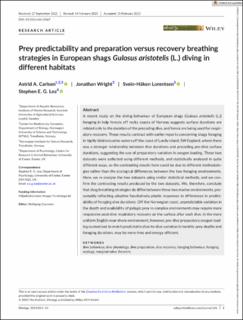Prey predictability and preparation versus recovery breathing strategies in European shags Gulosus aristotelis (L.) diving in different habitats
Peer reviewed, Journal article
Published version

Åpne
Permanent lenke
https://hdl.handle.net/11250/3057851Utgivelsesdato
2023Metadata
Vis full innførselSamlinger
- Publikasjoner fra CRIStin - NINA [2364]
- Scientific publications [1392]
Originalversjon
10.1111/eth.13367Sammendrag
A recent study on the diving behaviour of European shags (Gulosus aristotelis (L.)) foraging in kelp forests off rocky coasts of Norway suggests surface durations are related only to the duration of the preceding dive, and hence are being used for respiratory recovery. These results contrast with earlier reports concerning shags foraging in highly tidal estuarine waters off the coast of Lundy Island, SW England, where there was a stronger relationship between dive durations and preceding pre-dive surface durations, suggesting the use of preparatory variation in oxygen loading. These two datasets were collected using different methods, and statistically analysed in quite different ways, so the contrasting results here could be due to different methodologies rather than the ecological differences between the two foraging environments. Here, we re-analyse the two datasets using similar statistical methods, and we confirm the contrasting results produced by the two datasets. We, therefore, conclude that shag breathing strategies do differ between these two marine environments, presumably reflecting adaptive facultatively plastic responses to differences in predictability of foraging dive durations. Off the Norwegian coast, unpredictable variation in the depth and availability of pelagic prey in complex environments may require more responsive post-dive respiratory recovery on the surface after each dive. In the more uniform English near-shore environment, however, pre-dive preparatory oxygen loading customised to match predictable dive-to- dive variation in benthic prey depths and foraging durations, may be more time and energy efficient. dive behaviour, dive physiology, dive preparation, dive recovery, foraging behaviour, foraging ecology, marginal value theorem
